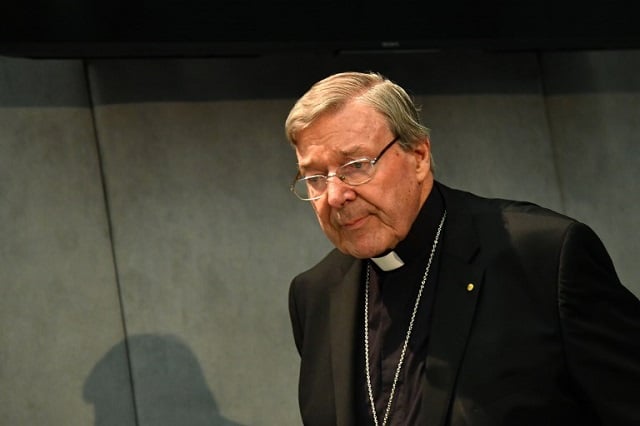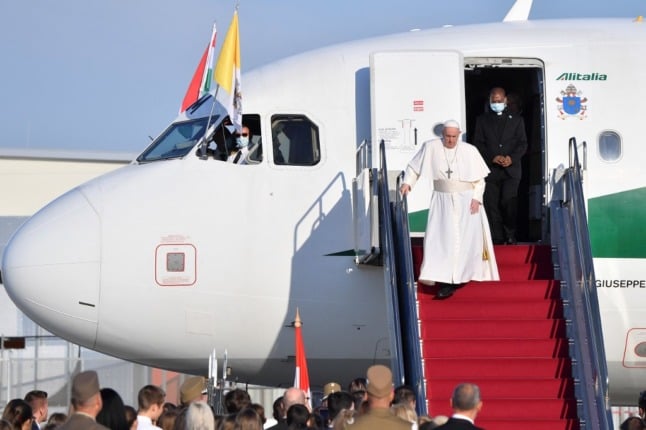Pell has been ordered to appear on July 18th before a Melbourne judge to answer unspecified multiple counts arising from his country's extensive inquiry into decades of abuse in institutions dealing with children.
The 76-year-old is the most senior cleric yet to be directly implicated in a multi-faceted scandal that has plagued the Church for decades but has never before come so close to its highest ranks.
As head of a powerful economic department, Pell is one of Pope Francis's closest advisors, his point-man on cleaning up Vatican finances and the number three in the Holy See's hierarchy.

Cardinal Pell leading a mass in 2008. Photo: William West/AFP
As such he is a much higher-profile figure than Keith O'Brien, the former archbishop of Edinburgh who renounced his rights as a cardinal in 2015 after admitting misconduct in relation to alleged drunken sexual assaults on young priests.
Pell has admitted errors in managing abuse by priests under his authority but denies any personal wrongdoing and Francis has offered him strong support.
But regardless of its outcome, the impending court case seems likely to further tarnish the image of a global institution long accused of complacency over a cancer in its midst.
Francis came to office promising a zero tolerance approach and an end to the kind of cover-ups portrayed in “Spotlight”, the Oscar-winning 2015 drama about how the Boston Globe uncovered widescale, unpunished abuse in the local diocese in the early noughties.
Critics say Francis's record has been patchy at best with his handling of some high-profile cases under scrutiny and attempts at institutional reform stalled by internal resistance.
Francis won praise in 2014 when he established an advisory panel on combating abuse that included two former victims. But Ireland's Marie Collins and Britain's Peter Saunders have both since quit the commission.
Collins left in March, accusing Vatican officials of “shameful” blocking of reforms, months after Saunders said he felt betrayed by Francis and was sidelined. The final straw for Collins came when officials in the Vatican Curia refused to guarantee that all letters from victims/survivors would receive a response, or cooperate with the commission on developing safeguarding guidelines.
READ MORE: 'I watched with dismay': Sex abuse survivor quits Vatican panel
Photo: Alberto Pizzoli/AFP
Other panel members responded that reformers had to be patient, describing change as a “long-term education job.”
The Vatican has since pledged to ensure complaints are responded to in the way Collins had demanded and Vatican watcher Iacopo Scaramuzzi says two senior officials have been sidelined for obstructionism.
“It is not true to say the pope is doing nothing. But there is a lot to do and it is an issue the Church has still to resolve,” he told AFP.
In 2016, Francis issued a decree intended to allow bishops to be removed from office if they failed to deal correctly with abuse cases. But the order was never passed down after being deemed surplus to requirements by the department in charge of implementing it.
Crime and sin
In the case of O'Brien, Francis was criticised for allowing him to keep his title of cardinal and failing to publish details of an internal Church investigation.
Similar issues arose in the case of Mauro Inzoli, an Italian priest convicted in 2012 of sexually abusing minors. Inzoli was finally defrocked only last month after Francis had initially reversed his predecessor Benedict's order to expel him from the priesthood.
Italian prosecutors had been severely critical of the Vatican's refusal to hand over details of the Church's own investigation of the priest. And abuse survivors say Francis's desire to display mercy to the likes ofInzoli betrays a dangerous ambivalence about the nature of his actions.
“The pope needs to remember there is a difference between crime and sin,” said Joelle Casteix of the US survivor network SNAP.
Scaramuzzi said Francis had missed a trick by not writing an obligation to hand over abusers to civilian authorities into canon law, the Church's internal set of rules.
Despite the criticism, some say Francis has made a decent fist of addressing an issue most societies have struggled to deal with.
In Ireland, one of the countries where the clerical abuse scandal has had the most profound impact, then-premier Enda Kenny said in March that Francis deserved praise for his efforts. In 2011, Kenny had accused the Vatican of “dysfunction, disconnection and elitism” on the issue.
READ ALSO: Four years as pope: Has Francis delivered his promised reforms?
By Angus MacKinnon



 Please whitelist us to continue reading.
Please whitelist us to continue reading.